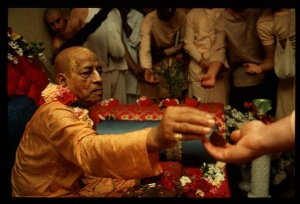CC Adi 4.257: Difference between revisions
m (1 revision(s)) |
(Vanibot #0054 edit - transform synonyms into clickable links, which search similar occurrences) |
||
| (One intermediate revision by one other user not shown) | |||
| Line 1: | Line 1: | ||
{{ | [[Category:Sri Caitanya-caritamrta - Adi-lila Chapter 04|C257]] | ||
<div style="float:left">'''[[Sri Caitanya-caritamrta|Śrī Caitanya-caritāmṛta]] - [[CC Adi|Ādi-līlā]] - [[CC Adi 4|Chapter 4: The Confidential Reasons for the Appearance of Śrī Caitanya Mahāprabhu]]'''</div> | |||
<div style="float:right">[[File:Go-previous.png|link=CC Adi 4.256|Ādi-līlā 4.256]] '''[[CC Adi 4.256|Ādi-līlā 4.256]] - [[CC Adi 4.258|Ādi-līlā 4.258]]''' [[File:Go-next.png|link=CC Adi 4.258|Ādi-līlā 4.258]]</div> | |||
{{CompareVersions|CC|Adi 4.257|CC 1975|CC 1996}} | |||
{{RandomImage}} | |||
==== TEXT 257 ==== | ==== TEXT 257 ==== | ||
<div | <div class="verse"> | ||
doṅhāra ye sama-rasa, bharata-muni māne | :doṅhāra ye sama-rasa, bharata-muni māne | ||
āmāra vrajera rasa seha nāhi jāne | :āmāra vrajera rasa seha nāhi jāne | ||
</div> | </div> | ||
| Line 12: | Line 16: | ||
==== SYNONYMS ==== | ==== SYNONYMS ==== | ||
<div | <div class="synonyms"> | ||
''[//vanipedia.org/wiki/Special:VaniSearch?s=doṅhāra&tab=syno_o&ds=1 doṅhāra]'' — of both; ''[//vanipedia.org/wiki/Special:VaniSearch?s=ye&tab=syno_o&ds=1 ye]'' — whatever; ''[//vanipedia.org/wiki/Special:VaniSearch?s=sama&tab=syno_o&ds=1 sama]-[//vanipedia.org/wiki/Special:VaniSearch?s=rasa&tab=syno_o&ds=1 rasa]'' — equal mellows; ''[//vanipedia.org/wiki/Special:VaniSearch?s=bharata&tab=syno_o&ds=1 bharata]-[//vanipedia.org/wiki/Special:VaniSearch?s=muni&tab=syno_o&ds=1 muni]'' — the saintly person named Bharata Muni; ''[//vanipedia.org/wiki/Special:VaniSearch?s=māne&tab=syno_o&ds=1 māne]'' — accepts; ''[//vanipedia.org/wiki/Special:VaniSearch?s=āmāra&tab=syno_o&ds=1 āmāra]'' — My; ''[//vanipedia.org/wiki/Special:VaniSearch?s=vrajera&tab=syno_o&ds=1 vrajera]'' — of Vṛndāvana; ''[//vanipedia.org/wiki/Special:VaniSearch?s=rasa&tab=syno_o&ds=1 rasa]'' — mellows; ''[//vanipedia.org/wiki/Special:VaniSearch?s=seha&tab=syno_o&ds=1 seha]'' — he; ''[//vanipedia.org/wiki/Special:VaniSearch?s=nāhi&tab=syno_o&ds=1 nāhi]'' — not; ''[//vanipedia.org/wiki/Special:VaniSearch?s=jāne&tab=syno_o&ds=1 jāne]'' — knows. | |||
</div> | </div> | ||
| Line 19: | Line 23: | ||
==== TRANSLATION ==== | ==== TRANSLATION ==== | ||
<div | <div class="translation"> | ||
"The sage Bharata has said that the mellows of lover and beloved are equal. But he does not know the mellows of My Vṛndāvana." | |||
</div> | </div> | ||
| Line 26: | Line 30: | ||
==== PURPORT ==== | ==== PURPORT ==== | ||
<div | <div class="purport"> | ||
According to expert sexologists like Bharata Muni, the male and the female enjoy equally in material sexual pleasure. But in the spiritual world the relationships are different, although this is unknown to mundane experts. | According to expert sexologists like Bharata Muni, the male and the female enjoy equally in material sexual pleasure. But in the spiritual world the relationships are different, although this is unknown to mundane experts. | ||
</div> | </div> | ||
__NOTOC__ | |||
<div style="float:right; clear:both;">[[File:Go-previous.png|link=CC Adi 4.256|Ādi-līlā 4.256]] '''[[CC Adi 4.256|Ādi-līlā 4.256]] - [[CC Adi 4.258|Ādi-līlā 4.258]]''' [[File:Go-next.png|link=CC Adi 4.258|Ādi-līlā 4.258]]</div> | |||
__NOTOC__ | |||
__NOEDITSECTION__ | |||
Latest revision as of 18:59, 19 February 2024
Śrī Caitanya-caritāmṛta - Ādi-līlā - Chapter 4: The Confidential Reasons for the Appearance of Śrī Caitanya Mahāprabhu

His Divine Grace
A.C. Bhaktivedanta Swami Prabhupada
A.C. Bhaktivedanta Swami Prabhupada
TEXT 257
- doṅhāra ye sama-rasa, bharata-muni māne
- āmāra vrajera rasa seha nāhi jāne
SYNONYMS
doṅhāra — of both; ye — whatever; sama-rasa — equal mellows; bharata-muni — the saintly person named Bharata Muni; māne — accepts; āmāra — My; vrajera — of Vṛndāvana; rasa — mellows; seha — he; nāhi — not; jāne — knows.
TRANSLATION
"The sage Bharata has said that the mellows of lover and beloved are equal. But he does not know the mellows of My Vṛndāvana."
PURPORT
According to expert sexologists like Bharata Muni, the male and the female enjoy equally in material sexual pleasure. But in the spiritual world the relationships are different, although this is unknown to mundane experts.